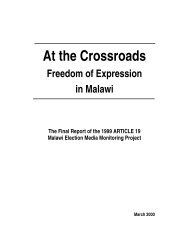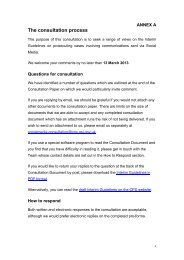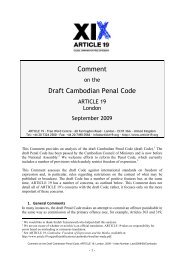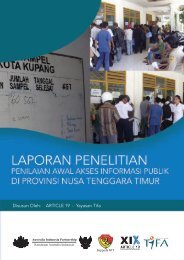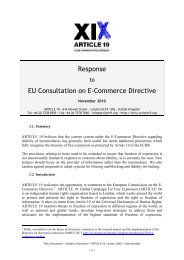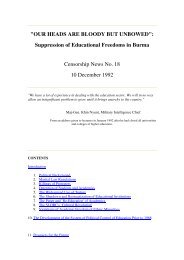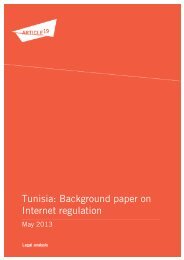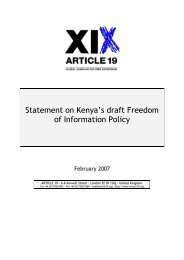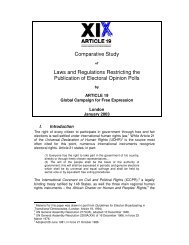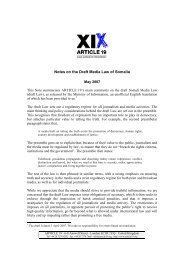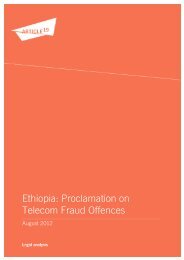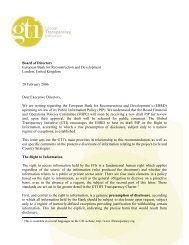FOR INTERNAL USE ONLY - Article 19
FOR INTERNAL USE ONLY - Article 19
FOR INTERNAL USE ONLY - Article 19
- No tags were found...
Create successful ePaper yourself
Turn your PDF publications into a flip-book with our unique Google optimized e-Paper software.
ARTICLE <strong>19</strong>GLOBAL CAMPAIGN <strong>FOR</strong> FREE EXPRESSIONfor farmers about what crops to grow, how and where to graze livestock, and information for thegeneral public on how to prepare vegetables and what vegetables to avoid. 235 Some other State bodiesalso produce publications on environmental issues. For example, the Commission on Economic Policyand the Kyiv City Council helped launch the journal Area of Sustainable Development. 236 However,even when publications or reports are produced, they are often not easily accessible. The number ofcopies produced is usually low and they are often not posted on websites. The Internet, as well as otherinformation dissemination channels, such as public libraries, are important in facilitating thedissemination of information to the public; unfortunately, however, how widely or effectively keyinformation gets disseminated is almost entirely left to the initiative of individual officials.In some cases, State bodies use the media to disseminate certain types of information. TheMEP has produced a few social information broadcasts. Some television programmes have coveredthe need to reduce gas consumption, but this was only in response to the energy crisis in 2005, whenRussia raised the price of oil and gas delivered to Ukraine. 237 Television programmes, however, tendto be costly, and the scant financial resources for public information do not allow the MEP to producemany of them.Overall there is little initiative to enhance transparency. Many believe that positive changes inthe aftermath of the Orange Revolution were subsequently reversed. 238 The ongoing power strugglebetween political elites has also had a negative impact on the nation’s environmental and informationpolicies. Between 2003 and 2007, there were four Ministers of Environmental Protection, each ofthem taking a different approach. Each change of Minister also involved the replacement of themajority of staff. For those NGOs that invest efforts in developing a dialogue with the relevant publicofficials and in providing training for them, frequent changes of staff result in a need for staff to be retrainedand contacts to be re-established. This can disrupt progress in the implementation of theAarhus Convention. 2399,&,4 5." Provisions requiring all environmental information to be open to the public are often not implemented.Not only do public bodies largely fail to disseminate on their own initiative environmental information235 Interview with the Civil Defence Institute, see note 80.236 A journal with a small circulation, produced four times a year, but whose funding was falling in 2006; amongits founders are the Commission on Economic Policy and the Kyiv City Council.237 Interview with Borys Vasylkivskyy, EcoPravo-Kyiv, see note 211.238 According to a monitoring study conducted by the Institute of Sociology in April 2006, immediately after theparliamentary election.239 Interview with Tetyana Tymochko, see note 49, May and July 2007.For Internal Use Only. Is Post-Chornobyl Ukraine Ready for Access to Environmental Information?ARTICLE <strong>19</strong>, London, 2007&*



